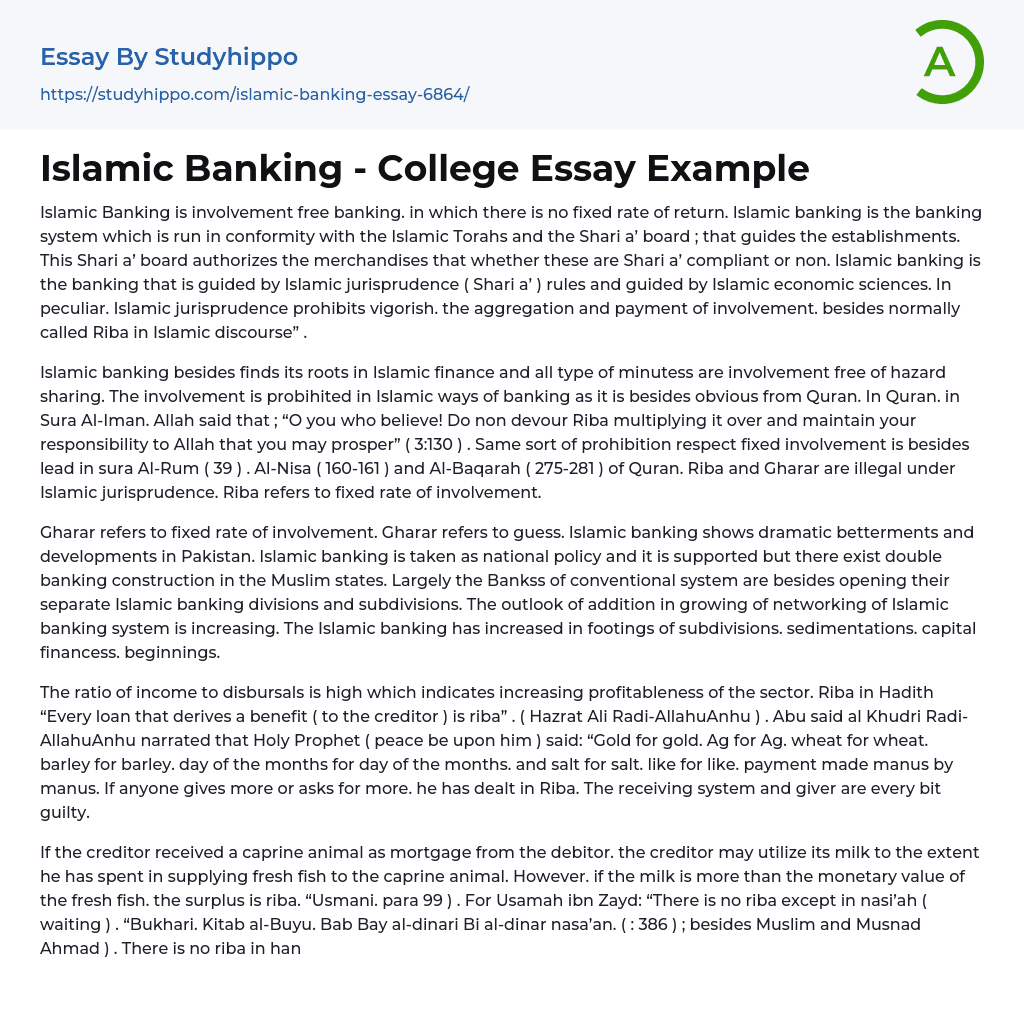Islamic banking, also referred to as interest-free banking, operates in accordance with Islamic laws and is guided by the Shari a' board which determines compliance with Sharia law. It strictly adheres to the principles of Islamic jurisprudence and economics, which prohibit the collection and payment of interest or Riba. This type of banking is based on risk-sharing rather than interest-based transactions, as dictated by Islamic finance principles. Various verses in the Quran explicitly forbid Riba, alongside Gharar (uncertainty or speculation), under Islamic law. Pakistan has made significant progress in developing its Islamic banking sector, supported by national policy; however, many Muslim countries maintain a dual banking structure where conventional banks have separate divisions for Islamic banking. The growth of the Islamic banking system is expected to continue as more branches are established and deposits, capital
...funds, and sources increase. Moreover, this sector's profitability is rising with a high income to expense ratio. To further understand the concept of riba (interest) in Islamic banking, teachings from Hazrat Ali Radi-AllahuAnhu emphasize that any loan benefiting the creditor constitutes riba. The Holy Prophet (peace be upon him) stressed equal exchange in transactions and considered any excess as ribaUsamah ibn Zayd's argument is that riba, a prohibited practice in Islam, only occurs when payment is delayed. This viewpoint can be found in various Islamic texts such as Bukhari, Muslim, and Musnad Ahmad. According to Muslim's Kitab al-Musaqat and Nasa'i, hand-to-hand transactions do not involve riba. The appeal of Islamic banking in emerging markets stems from its ability to protect financial institutions from the negative impacts of the economic crisis that followed the recession. Unlike conventional banks, Islamic banks hav
not faced significant losses due to investing in toxic assets or relying on wholesale funds since these practices are non-compliant with Sharia Law. Moreover, there is increasing interest in Islamic banking beyond Muslim investors. Despite only 5% of its population being Muslim, the United Kingdom has emerged as a prominent center for Islamic banking. Governments and regulators worldwide now recognize the importance of Islamic banking as an alternative to conventional banking systems, especially after the global recession triggered by Lehman Brothers' collapse in September 2008. This recognition acknowledges that unequal regulation played a role in the financial crisis and has prompted a moral examination of investment industry practices. As a result, there have been significant changes in investment dynamics post-recession, creating new opportunities for the Islamic private equity and venture capital sectors.
The significance of a system that prohibits gambling and requires tangible assets as backing has become crucial in the current economic climate. Many cautious rescuers and investors are opting for this low-risk system. There is an increasing demand for an ethical approach to investing following the crash, with a particular focus on partnerships in private equity and venture capital. Even before the full impact of the global downturn, Islamic private equity and venture capital had already caught the attention of both regional and global investors. Companies are merging to tackle the challenges posed by the economic downswing. The text emphasizes the growing necessity for a collaborative approach to private equity and venture capital investing, especially in infrastructure-related sectors such as transportation, energy, healthcare, and education. These sectors not only provide investments backed by assets but also contribute to long-term societal development. Given the current
demand for responsible investment in a post-recession world, Islamic private equity and venture capital are well-positioned to meet this requirement.
- Investing essays
- Asset essays
- Depreciation essays
- Discounted Cash Flow essays
- Foreign Direct Investment essays
- Funds essays
- Internal Rate Of Return essays
- Revenue essays
- Day Trading essays
- Futures Trading essays
- Capital market essays
- Million essays
- Payment essays
- Rate Of Return essays
- Funding essays
- Hedge Fund essays
- Quran essays
- Al-Qaeda essays
- Muhammad essays
- Muslim essays
- Ali essays
- Ramadan essays
- Bank essays
- Banking essays
- Corporate Finance essays
- Credit Card essays
- Currency essays
- Debt essays
- Donation essays
- Enron Scandal essays
- Equity essays
- Financial Accounting essays
- Financial Crisis essays
- Financial News essays
- Financial Ratios essays
- Financial Services essays
- Forecasting essays
- Foreign Exchange Market essays
- Free Market essays
- Gold essays
- Investment essays
- Legacy essays
- Loan essays
- Market Segmentation essays
- Money essays
- Personal finance essays
- Purchasing essays
- Retirement essays
- Shareholder essays
- Stock Market essays




